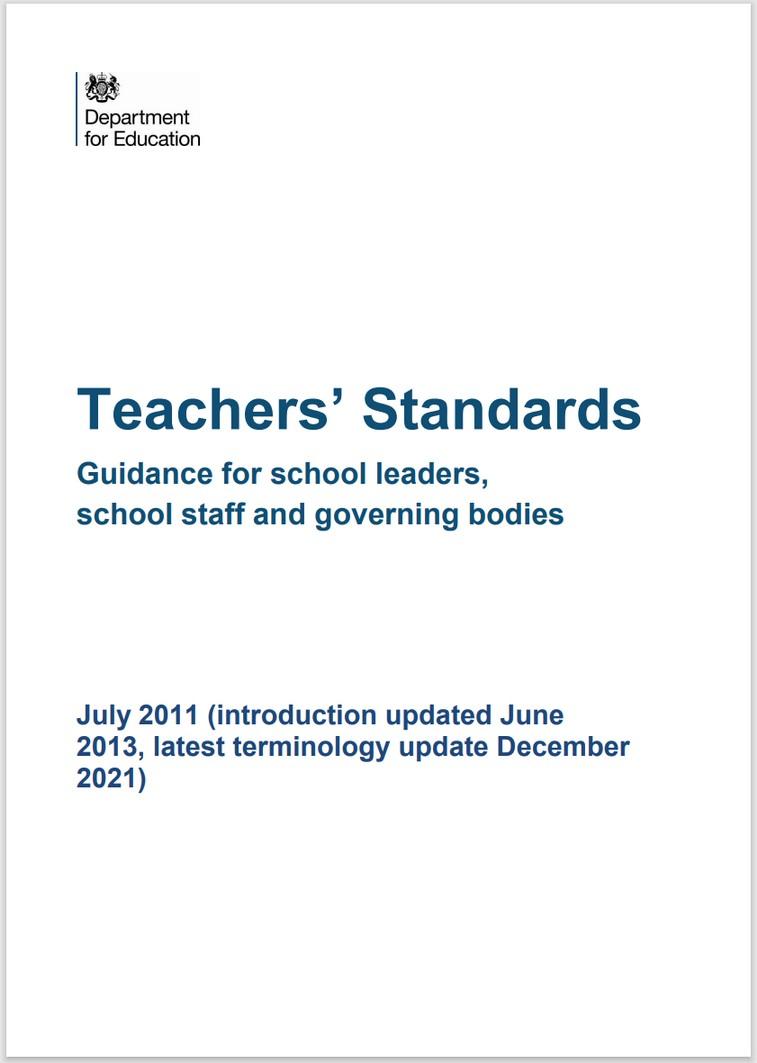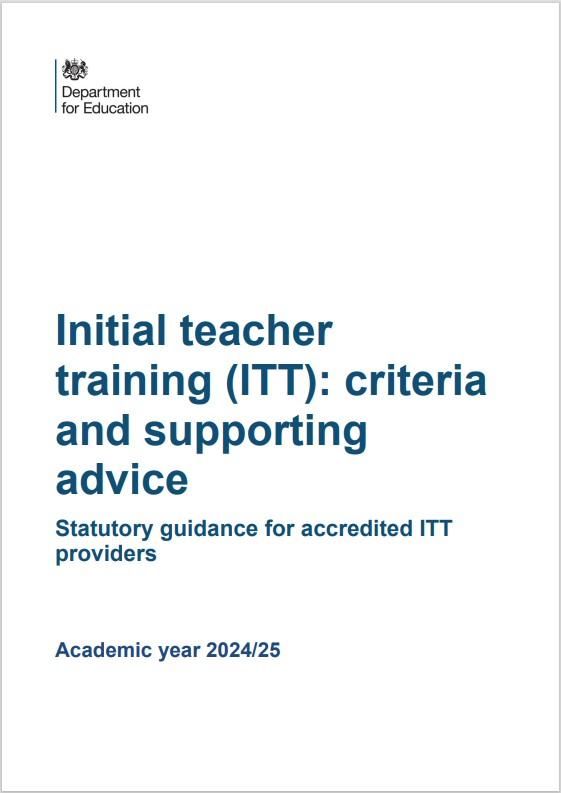Initial teacher training (ITT) reform Information for schools
November 2023

About

November 2023

About
Schools, and other educational settings, play an essential role in Initial Teacher Training (ITT) by hosting placements and providing mentors for trainee teachers.
This slide-deck is designed to support accredited ITT providers and Teaching School Hubs (TSHs) in their engagement activity with potential school partners. It includes information on ITT, the important role schools play in training the future generation of teachers, and the benefits ITT presents for schools.
As part of their ITT course, every trainee teacher must get experience teaching in at least two schools and receive clear and consistent mentoring during each placement.
Trainee teachers need a variety of experience in schools to enable them to meet all the Teachers’ Standards. They need to teach children and young people in their specified age range, from different backgrounds, as well as gaining experience of different approaches to teaching and to school organisation and management.
This breadth of experience is designed to equip trainee teachers with the skills they need to successfully enter the teaching workforce, and to become an asset to the schools they teach in.
Trainees are assessed against the Teachers’ Standards at the end of their course. Trainees who demonstrate all the standards at the appropriate level are recommended for QTS
Teachers’ Standards guidance (publishing.service.gov.uk)


Schools
Recruit the welltrained teachers that schools need

Help teachers fulfil their potential and feel supported in their role from the very start of their career

Pipeline of new teachers to the profession Workforce

Ensure excellent teachers for every child
Teacher training is not possible without school placements.
We know that many schools view supporting the training of the next generation of teachers as part of their professional purpose. As well as supporting their own school recruitment needs, by providing school placements, schools enable the pipeline of new teachers to the profession.

Opportunities to work with talented trainee teachers, who may be a strong fit for future teaching vacancies in their placement school

Professional development for teaching staff who provide mentoring and support for trainee teachers

Access to the latest research, practice and innovation on teaching and support for children and young people

Access to support from ITT Providers and their wider networks
‘In our school, involvement in Initial Teacher Training (ITT) has been a valuable resource for several key aspects of our educational ecosystem. Firstly, we've effectively utilized our participation in ITT to recruit new teachers.’ –
Urban/Inner city junior school
‘It enables us, as a school to observe professional behaviours and conduct, as well as the obvious classroom teaching and helps us in our quest when recruiting. We have employed two ITT students over the past couple of years, as they have learnt their trade in our setting, and it has been a seamless transition into their years as ECTs and beyond.’ – 2-form entry, urban primary school
‘Being part of the ITT Provider means we have the opportunity to 'grow our own' teachers by hosting several trainees each year who are then appointed as ECTs. By placing several trainee teachers in the school, it allows us to make recruitment decisions early in the year and proactively plan two terms ahead. As these teachers have been trained within the school environment, they are already familiar with the school's culture, policies, and expectations. This can lead to a more seamless integration into the school's teaching staff.’ – Large primary school academy
‘While trainees are training within our school, they also bring many advantages. Trainees, although in teaching terms may appear as 'novices,' working towards the goal of becoming expert adaptive teachers, bring with them a wealth of experience in many different areas that can be utilised in various ways around the school, through extracurricular activities or even peer-topeer support. This also supports building capacity to offer more opportunities for the children to build their cultural capital.’ – Large primary school academy
‘Hosting trainees is an essential element of our recruitment and retention culture. By welcoming these highly motivated and well-prepared individuals into our school community, we are able to work alongside the ITT provider to provide rigorous training in evidence-based teaching methods, supported by our expert teacher mentors. Our staff are enriched by the opportunity to share their knowledge and refine their own skills as they guide each trainee.’ – Community primary school

Teaching experience in a classroom
Schools provide trainee teachers with:
Support from a trained mentor, including weekly mentor meetings
Opportunities to shadow and learn from experienced teachers
Feedback, advice and reflection
Nurturing environment in which to learn, grow and develop their own teaching style
The golden thread is ensuring that schools get the well-trained teachers that they need to ensure high quality teaching in schools.
Schools play a critical role in this golden thread of professional development.
Initial Teacher Training
All courses offered by accredited ITT providers are aligned to a mandatory Core Content Framework (CCF), which sets out a minimum entitlement for all trainee teachers
Early Career Framework
After achieving qualified teacher status (QTS), all early career teachers (ECTs) are entitled to 2 years of development support and training based on the Early Career Framework (ECF)
3-year structured package of support
Evidence base independently assessed and endorsed by the Education Endowment Foundation
National Professional Qualifications
A suite of training programmes is available for teachers and leaders at all levels, from those who want to develop expertise in high quality teaching practice, to those leading multiple schools across trusts
Fully funded training scholarships are available for teachers and leaders employed in state funded schools and 16-19 organisations
‘Our school collaborates closely with the ITT provider to ensure that trainee placements align with the needs of both the trainee and the school. We specify the year groups where we can effectively support trainees, such as Year 6 placements, ensuring a harmonious match that benefits all parties involved.’ –
Urban/Inner city junior school
‘As an ITT placement school, we have always invested time in our students and included them in everything we do. They are integrated into the staff room, are invited to staff meetings and CPD and treated as one of our staff members. We feel that by doing this, they are immersed in the full experience of day-to-day life in schools. This supports professional working and the extra things that teaching involves and ensures students don’t have any illusions about the profession.’ – 2-form entry, urban primary school
‘We have been fortunate enough to work with strong trainees who have gained employment and remained at the school in a range of subjects including Science, English, History, Music and Art amongst others. As a school, it has been encouraging to see the rapid progress that teachers in their early years have made throughout their training year and into their ECT years. One example of a trainee who has developed rapidly throughout his placement, and subsequent employment at [our school], was a History ITT. He joined us for his second placement and demonstrated strong resilience through being a reflective practitioner. As a result, during his training year, he was able to deliver and share best practice with the entire staff body – demonstrating the confidence he has built and grown throughout his training year. He was able to take on a permanent position within the History department and worked in the immediate weeks following the completion of his ITT year. He is now a valued member of the History department, consistently contributing on a department level. The managing mentor/induction tutor in school will be looking to give him experience throughout the coming years of observing and delivering feedback with the view to becoming a mentor and sharing his expertise in the future.’
- Inner city, all-through school
Through an expert advisory group and consultation, the Department for Education (DfE) conducted a review of ITT with the aim to make well informed, evidence-based recommendations on how to make sure:

All trainees receive high-quality training in the ITT market

The ITT market maintains the capacity to deliver enough trainees and is accessible to candidates

The ITT system benefits all schools
The review recommended a new set of quality requirements to be implemented by all ITT providers, to ensure a consistently high standard of ITT provision across the sector.
These requirements cover a range of areas, including new mentoring requirements.
These will ensure that mentors are well trained in how to be a mentor and to understand the ITT Core Content Framework (CCF) and underpinning evidence, and the ITT curriculum the trainee is following, so that they can effectively support the trainee’s progress during school placements.
There are also new quality requirements relating to curriculum, assessment and progression of trainees, and quality assurance which are reflected in the updated ITT criteria and supporting advice for 2024/25.
Following the reforms, from September 2024 there will new quality requirements for all ITT courses. These include:

Mentoring –minimum of 1.5 hours of mentor time per week for trainees and mentor training requirements

A more strategic role for Teaching School Hubs in ITT, so that they can support their local school networks to be involved

Intensive Training and Practice (ITAP) is a new element which must be part of all ITT courses

From September 2024, accredited ITT providers must ensure their courses meet the new quality requirements.

The new quality requirements help ensure that every trainee receives an entitlement of 1.5 hours per week of mentoring support. All school-based mentors will have access to up to 20 hours of initial mentor training supported by funding (followed by 6 hours of refresher training in future years).

The accredited ITT provider will provide training to help mentors understand:
• what is involved in the mentor role and the skills they need
• the ITT core content framework and its underpinning evidence
• the ITT curriculum which the trainee will be following.
ITT providers will take into consideration any prior learning that mentors might have completed, including as an Early Career Framework (ECF) mentor, to avoid unnecessary repetition of training.
The aim of this is to avoid duplication and build on a mentor’s prior learning, which as a result may reduce the total hours of training a mentor needs to complete.



Enhanced professional learning and opportunity to develop their professional skills
Enhanced knowledge and understanding of the latest evidence on what makes good teaching
Opportunities for CPD available from providers and within the school/MAT network as a result of being a mentor to trainees
Improved teaching practices and enhanced professional learning and development
Supports trainees in developing professional skills supporting teacher development, also linked to career development opportunities.
The role of the schoolbased mentor is pivotal to the success of ITT placements
Mentors have access to the latest evidence base of what works in teaching, that can be embedded into wider school teaching practice and continuous school improvement
Schools supported to build mentor pathways into their career mapping.
Research taken from:
National Institute of Teaching - Mentoring and coaching trainee and early career teachers: Conceptual review, published Nov 2022 Schools’ Experiences of Hosting Trainees and Employing Newly Qualified Teachers; CooperGibson research, published 2019
[For TSHs to complete/include based on experience of different ways in which schools are finding time for mentors to effectively undertake this role]
Part of the new quality requirements is the introduction of a new role known as lead mentor(s). It is the responsibility of the accredited ITT provider to identify and train lead mentors to provide support across placement schools.
As well as supporting the design and delivery of curriculum elements such as Intensive Training and Practice, the core role of lead mentor(s) is to support school-based mentors and play a key role in their training and supervision.
Lead mentors will support the training and development of school-based mentors and ensure that all trainees are receiving sufficient mentoring, and both the mentor and trainee are supported during placements. This improved support for mentors will lead to stronger alignment between what the trainee is learning, observing and practising with their ITT provider and in their placement school.
‘As many ITT mentors have also been ITTs/ECTs with us, we have developed a group of strong mentors who follow a consistent approach to the role. As our mentors have all experienced what a strong mentor looks like, they are then able to continue this and maintain the same strong standards in school. As a result, mentors realise the importance of giving time to their trainees and supporting them, especially in the early weeks of a placement. By investing this time to support their trainees, mentors are then able to experience the dividends of this as trainees feel comfortable and supported.’ – Inner city, all-through school
‘It is important to not understate the value and opportunities that being a mentor brings to a more experienced teacher. Some of our mentors have been asked to be included on interview panels to help recruit new trainee teachers and they have spoken about how this CPD has been very useful in preparing them for a middle or senior leadership role within the school’ – Large, urban secondary school
‘Initial Teacher Training does not only have a positive impact from the perspective of the trainee, but it also offers a wide range of professional development opportunities for current members of staff wishing to advance their own careers. Experienced staff members can become mentors, support tutors, and even facilitate during the trainee’s professional studies days; opportunities that could be the difference between retaining that staff member or them moving onto another school for greater opportunities or even different sectors entirely.’ – Large primary school academy
‘Mentoring allows teachers the opportunity to pass on their expertise within the school, giving praise and building confidence around school, as well as giving clear, manageable areas of development with ‘next steps’.’ – Inner city, all-through school
‘Within the school, we look at utilising the strong training that ECTs have received [with external providers] and within school CPD to train ECTs at the end of their second induction year. By upskilling, investing and developing mentors from strong ECT 2s, it enables the school to continue to develop a cycle of strong mentors, middle leaders and the next generation of Senior Leaders.’ – Inner city, all-through school
‘We have not only welcomed trainee teachers but also provided continuous support and guidance to mentors who have been instrumental in nurturing these trainees over several years. Furthermore, our school recognizes the potential for career development among experienced teachers through ITT. These educators have taken on roles as mentors and have become experts in various elements of ITT. They work alongside trainees from different year groups, showcasing their expertise and leading trainee development. To guarantee mentors can effectively perform their roles, we allocate additional time outside of the classroom, often drawing from Planning, Preparation, and Assessment (PPA) time.’ – Urban/Inner city junior school
‘Because we value the experience of our ITT students, we ensure the mentor is carefully selected and given time to support the trainee. They access any training provided by the course providers and complete the paperwork/meetings with tutors etc.’ – 2-form entry, urban primary school
‘Schools welcome the opportunity for mentors to visit their trainee whilst on their cross-phase second school experience. This supports trainees to reflect on what they have learned and are applying to their new school and enables the mentor to continue to see the trainee’s development outside of their own setting. Mentors frequently comment on how powerful this is, enabling them to be ‘context free’ and not entrenched in the knowledge of the class/cohort.’ –Initial Teacher Training Provider
‘We have some members of staff, who are experienced in mentoring, and they enjoy supporting the development of others. It supports their own career development, and they say they learn things from others, so find new ways of teaching and adapting through the eyes of their students, too.’ – 2-form entry, urban primary school
‘The ITT Provider allows our teaching team to develop valuable mentoring experience and the training provided has been applied to working with other stakeholders. Having mentors able to visit other schools to see their trainees on placement has been invaluable; in Spring 2 a teacher is always telling me about a fantastic piece of practice they will be stealing from what they have observed!’ – Large primary school academy
To facilitate and support mentor training, the DfE has made funding available for schools.
This is in addition to the funding placement schools receive from accredited ITT providers to reflect their role in delivering ITT.
Further detail can be found in our ITT reform funding guidance.
This funding will help with the cost of teachers being away from the classroom while they train. This could include:
• Paying for someone to take over lessons while a teacher is training
• Paying for someone to teach if a teacher takes time off in lieu to train
• Overtime payment to the teacher, if they are training outside of normal working hours (teacher workload should be carefully considered in such cases)
• Paying for any costs that come from reducing a teacher’s other responsibilities, so they have time to train
This funding can be accessed by schools that offer placements to ITT trainees and have mentors working with ITT trainees who started their training any time between 1 st September 2024, and 31st May 2025.
The amount of funding received by schools depends on the location of the school, and how many hours a teacher has spent training to be a mentor.
Schools will be able to claim this funding at the end of the 2024/25 academic year and will be paid in arrears between September 2025 and January 2026. When schools make a claim, DfE may ask for evidence of:
• A mentor’s employment at the school
• Arranging placements at their school for ITT trainees
• The hours of initial mentor training.
For a school to claim this funding, the mentor must:
• Undertake up to 20 hours of initial mentor training
• Mentor at least one trainee
Mentor training typically will commence at the start of the academic year or during the preceding summer term, and in many cases, will be spread across the year.
Not all mentor training has to be completed before mentors can begin to support trainees. Providers operating in your area will be able to give more detail on how their mentor training programme will work.
More information on how to apply will be available for schools from Spring 2024.
For further information on ITT Reform funding, please refer to the published guidance. For specific information about the amount of funding available to schools, please see page 16.
Another way that schools can get involved in ITT is through supporting Intensive Training and Practice.
Intensive Training and Practice is not part of the ITT placement, although placement schools may wish to support Intensive Training and Practice too. Other schools can also be involved in supporting Intensive Training and Practice.
Intensive Training and Practice is a new element that must be incorporated into all ITT courses leading to QTS from September 2024.
Intensive Training and Practice will intensively focus on analysing evidence of pivotal aspects of teaching, putting this into practice immediately, and receiving immediate focused feedback on this practice.
It is not the responsibility of schools to design and deliver the Intensive Training and Practice; this is a course requirement fulfilled by the accredited ITT provider, who will be able to discuss this element with you in more detail.
The trainee will receive 4 weeks of Intensive Training and Practice over their ITT course (this is 6 weeks for undergraduate ITT courses). This may be split in to 1-week blocks and only some of this time will be spent in school for structured observation and deconstruction of expert practice, rehearsal and live practice, followed by immediate structure feedback.
Intensive Training and Practice topics will be pivotal or foundational elements of classroom practice that all teachers need, irrespective of context. For example, behaviour management as a topic would be too broad, but a focus on how setting classroom routines can support behaviour management would be appropriate.
• Intensive Training and Practice is not part of the school placement but an additional element of the provider's ITT curriculum.
• A typical Intensive Training and Practice block will include expert input, observation, opportunities to practice in both a controlled and live environment, and expert feedback throughout this process. Some elements of Intensive Training and Practice will take place in the ITT institution, or virtually, and some will need to take place in a school environment, such as the live classroom practice.
• Many schools will be well placed to welcome individual or groups of trainees, to allow them to observe strong practice in the area being examined and give them the opportunity of live classroom practice.
• Intensive Training and Practice will be supported by an appropriate range of experts, which can include lead mentors from the ITT provider and other experts within the school.

Could you use this expertise to support an Intensive Training and Practice? If you would like to be involved, please contact your local TSH.
From September 2023, all TSHs are delivering new strategic roles to support local ITT delivery across their area.
TSHs will play an important regional role in their area working with schools and accredited ITT providers to understand the local market, context and challenges.

TSHs will also be able to offer information and support to schools wishing to engage in ITT for the first time or increase their engagement in ITT.
DfE are aiming to build a picture on situations where there is a surplus of trainees in a specific location, and similarly where there is a surplus of school placements available but not enough trainees, to ensure all schools have access to high quality and well-trained teachers.
You will be contacted by your local TSH to understand your current and possible future engagement with ITT. The TSH will collect a range of data on your engagement with ITT.
This is not personal data. This is not mandatory, but the DfE strongly encourages schools to engage with TSHs and provide this information.
The information will be shared with the DfE to support our understanding of school engagement in ITT and may be shared with accredited ITT providers as part of TSH engagement with them.
• It is a core responsibility of trusts to make a positive contribution to the wider system by delivering high quality training and/or placement for trainee teachers.
• We want to encourage high quality trusts to deliver training and offer a range of placements (general and the Intensive Training and Practice element) and mentors for trainee teachers, to support system wide sufficiency.
• Ahead of September 2024 when the new ITT requirements are implemented, it is important that trusts start to consider how they interact with ITT, including:
How to offer ITT placements if not already doing so?
Your capacity to be involved in ITT?
How to prepare for the new mentoring requirements?
• Trusts should discuss their approach and involvement in ITT with their delivery officers.
Commissioning high-quality trusts - GOV.UK (www.gov.uk)
DfE accredits a range of organisations to deliver primary and secondary ITT, this includes HEIs, charities and school-based providers. To offer an ITT placement in your school for a trainee teacher, you need to partner with an accredited ITT provider. Contact your nearest TSH to get advice on offering an ITT placement.
If you already offer ITT placements, you’ll need to check that your existing ITT provider is part of a partnership accredited to offer teacher training courses from September 2024. If they are not, contact your local TSH to get advice and help you find a local accredited ITT provider to work with. Your local TSH will be able to provide relevant information including:
The different ways to be involved in ITT
Information on accredited ITT providers within the area
The new ITT reforms and requirements due to be implemented from September 2024 and what that means for you, including the new Intensive Training and Practice opportunities for trainees
[For TSHs to complete based on all providers offering ITT in their area.]
Possible information to include:
• Provider name
• Provider location
• Structure, size, how many trainees per year
• Routes offered
• Lead contacts